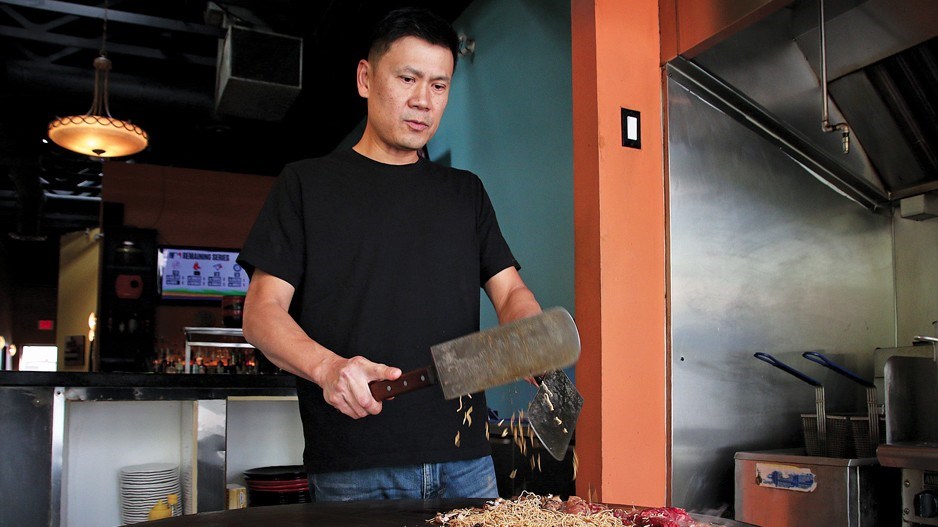Restaurant owners seeking sufficient staff to keep dining rooms open have a few options: buy cutting-edge technology, hire people who may be overlooked but who want jobs or pursue a mix of both.
The Happy Lamb Hot Pot restaurant chain that has four Metro Vancouver locations was the first in the province in mid-2021 to start using GreenCo Group robots to conduct repetitive tasks, such as moving food from kitchens to diners, GreenCo owner Liang Yu told BIV.
Yu’s Edmonton-based company, which distributes robots made by Chinese manufacturers, has since supplied robots to bistros such as Nanaimo’s Driftwood Restaurant and Victoria’s Mantra Indian Cuisine.
Contracts vary. GreenCo sell robots for between $20,000 and $30,000, leases them to own on a three-year basis for about $1,000 per month, and rents them for about $1,700 to $1,900 per month.
Industry insiders might be quick to say that diners prefer human interaction, and that the novelty of a robot delivering a meal would wear off quickly. Yu, however, said that restaurants can also hire human servers to engage with customers, and that those workers would save time by not having to carry out the time-consuming back-and-forth between the kitchen and customer tables.
Human staff would also have time to wait on more tables, thereby increasing their tips.
Industry advocates, such as the British Columbia Restaurant & Foodservices Association, are lobbying to have the federal government process foreign-worker visas more speedily.
One alternative source of workers is Dan’s Legacy, which teaches culinary skills to at-risk youth, and those previously having lived on the streets, struggling with addictions.
Dan’s Legacy launched in February, and has had a series of 12-week training programs, where students spend 20 hours per week in classrooms and kitchens, learning cooking skills while also watching videos from celebrity chefs, such as Gordon Ramsay.
“The program provided such good practice,” said recent graduate Jasper Nelson-Joseph.
“We prepped for the Union Gospel Mission (UGM), and we prepped for ourselves. At the UGM we made all of their hash browns, and all the meat, all of the meals that all the homeless people get to eat every day.”
Nelson-Joseph, who is 21 and Indigenous, grew up in East Vancouver with extended family and his grandmother but left home when he was 14 years old, he said.
Nelson-Joseph moved to the hamlet of Quatsino, on Vancouver Island, for a couple of years.
He made it to Grade 12, but did not graduate, he said, because he struggled with alcohol and had to take some time off to deal with his grandfather’s death.
Newly hired at the Mongo Bongo Mongolian Grill in New Westminster, Nelson-Joseph appreciates being able to work in the industry and provide for his young son.
His favourite part of the job is preparing stir-fry meals in front of customers on large hot plates, he said.
“Jasper has been on time, or showed up for work the majority of the time, and I’m very pleased that there’s growth every day, which is all I can ask,” said Mongo Bongo Mongolian Grill owner Peter Fung, who learned about Dan’s Legacy from a customer.
“He does cooking, prepping, dishes, some cleaning, sweeping, mopping – you name it. We’re short staffed.”
Struggles finding staff mean that Fung closes his 11-year-old, six-employee restaurant on Mondays. Fung works long hours six days per week but would operate seven days per week if he were able to find more staff.
Fung said he thinks the Canada Recovery Benefit, aimed at providing financial support to workers sidelined because of the pandemic, has added to the challenges in finding labour.
“I have seen more resumés coming in, but it is not at the pace that it used to be, when I would place an ad seeking help. It’s not even close.”
Two of five recent Dan’s Legacy graduates have found jobs at restaurants; two others plan to take formal culinary education.
Six students are enrolled in the current group and are expected to complete the program on December 10. •




